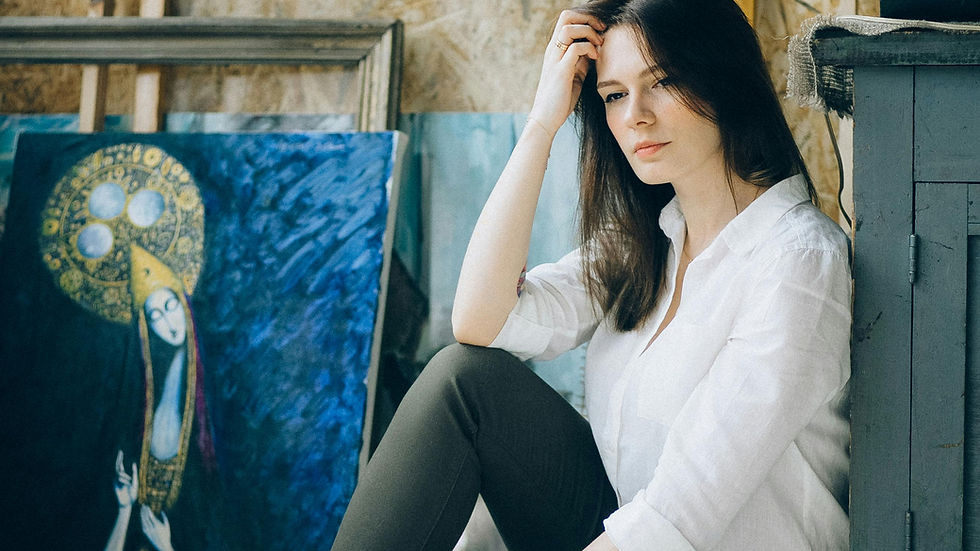Why Every Creative Needs a Therapist: Navigating the Emotional Rollercoaster of Creativity
- Dr. Fanny Ng

- Jun 25
- 3 min read
Updated: Sep 7
Creativity is a beautiful thing. It allows us to express ourselves and to engage with the world around us in exciting ways. However, creativity can also have its challenges, especially when it becomes a profession. While making a career out of creativity is a privilege, it can come with imposter syndrome, job insecurity, creative blocks, perfectionism, and burnout.
We’ve all heard the old saying: “You have to suffer for your art.” This harmful idea suggests that to succeed, artists must struggle. Creatives often feel they should handle their emotional ups and downs on their own. But what happens when the pressure becomes overwhelming? That's a clear sign that it’s time to seek help.
As a therapist specializing in working with creatives, I explore the reasons artists might seek therapy and the various benefits it offers, not just for those at their breaking point.

The Emotional Rollercoaster of Creativity
Anyone who has worked in a creative field knows the emotional highs and lows that come with it. There are exhilarating moments when inspiration strikes. You might feel a rush of euphoria as ideas flow. Then, there are the lows, marked by frustration, doubt, and even rejection.
Creative work is deeply personal, which can lead to vulnerability and self-questioning. You may find yourself fearing rejection or wondering why you chose this path. External factors like criticism, financial struggles, and the pressure to meet deadlines further complicate matters. The constant need to innovate can leave you feeling drained. Balancing your creative ambitions with everyday responsibilities, like paying rent, exacerbates this struggle.
It's no wonder many creatives search for calm amidst the chaos.

Why Seek Therapy?
I firmly believe therapy can benefit everyone, especially those in creative fields. Many artists face similar challenges: emotion regulation, perfectionism, self-doubt, and burnout. How can therapy help with these issues?
Emotion Regulation: Therapy provides a safe space for creatives to process their emotions. It helps you identify emotional triggers and develop skills to manage them effectively.
Perfectionism: Therapy encourages you to move beyond perfectionism and embrace authenticity. Accepting imperfection can open the door to healthy, productive creativity.
Self-Doubt: As artists, we often act as our harshest critics. Negative self-talk and feelings of being an imposter can paralyze you. Therapy helps nurture a more compassionate inner voice and improves your self-relationship.
Burnout: Creative professionals are at an increased risk for burnout due to their demanding careers. Therapy can help you recognize early warning signs of burnout and develop coping strategies for maintaining balance.
Therapy Can Enhance Your Creativity
Therapy significantly impacts your mental and emotional health. It can also serve as a powerful tool for enhancing your creativity. Addressing underlying emotional issues clears mental clutter. This allows for a freer, more focused creative process. Learning to regulate your emotions helps you tap into them during creative pursuits without becoming overwhelmed.
In therapy, you can clarify your values, helping you chart a path in both your personal and professional life. Therapy also teaches valuable boundary-setting skills. A therapist can guide you in establishing healthy boundaries around your work and personal time. This prevents overworking and boosts the quality of your creative output. Achieving this balance enhances your enjoyment of your creative career and its sustainability long-term.

Approaches We Use in Therapy
Finding a therapist who aligns with your needs is crucial. Each therapist has a unique approach. Here at Rise, we offer diverse therapeutic techniques tailored for creatives, including:
Acceptance and Commitment Therapy (ACT): This approach teaches mindfulness and flexibility, improving your relationship with thoughts and feelings.
Dialectical Behavioral Therapy (DBT): This method equips you with practical skills for managing distress, regulating emotions, and enhancing relationships.
Cognitive Behavioral Therapy (CBT): CBT helps challenge negative thought patterns, replacing them with thoughts that promote mental and emotional health.
Is Therapy Right for You?
Therapy isn't solely for those in crisis. You don’t have to wait for turmoil before seeking support. Therapy serves as a valuable tool that helps creatives grow, thrive, and improve their mental health. Are you feeling disconnected from your creative spark? Overwhelmed by negative self-talk? Perhaps you just need someone to listen.
Creativity should uplift us, not burden us with stress or doubt. Remember, seeking help is a sign of strength. Embrace your creative journey and prioritize your mental well-being!




Comments